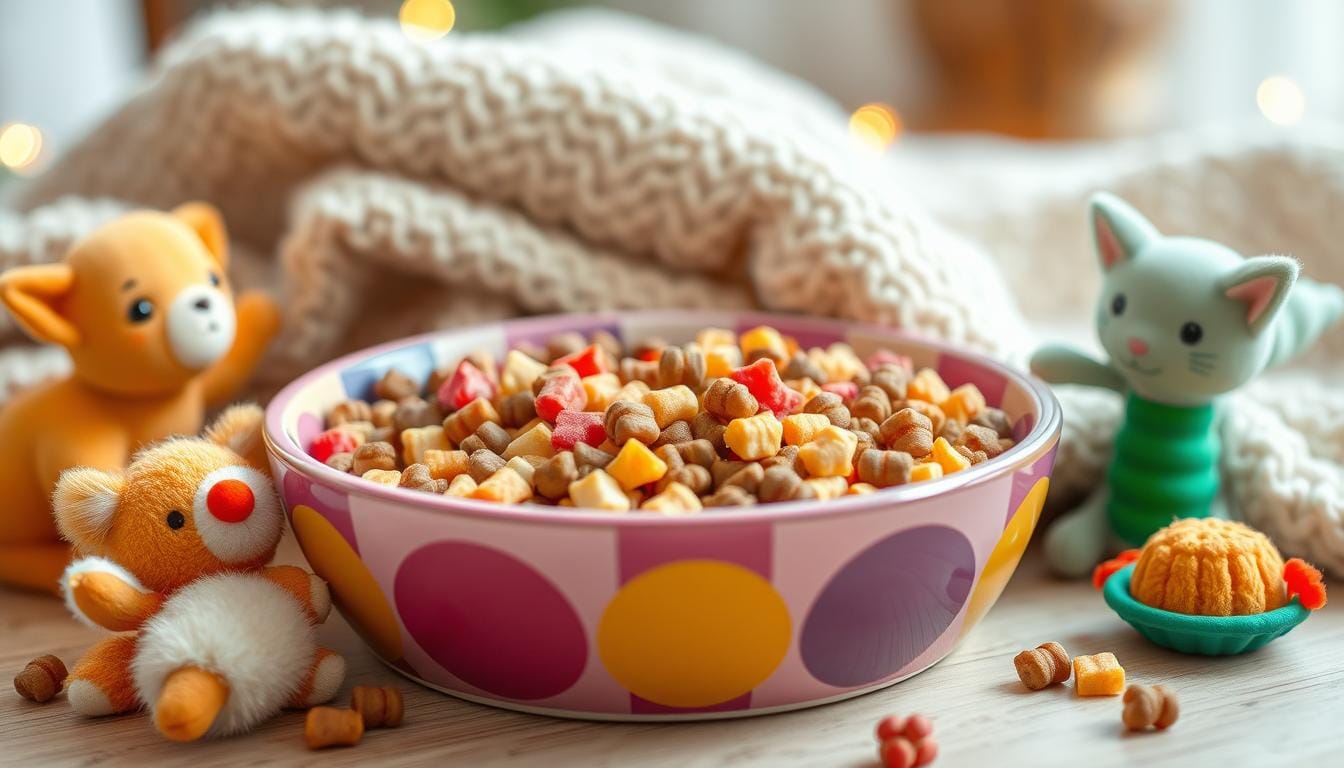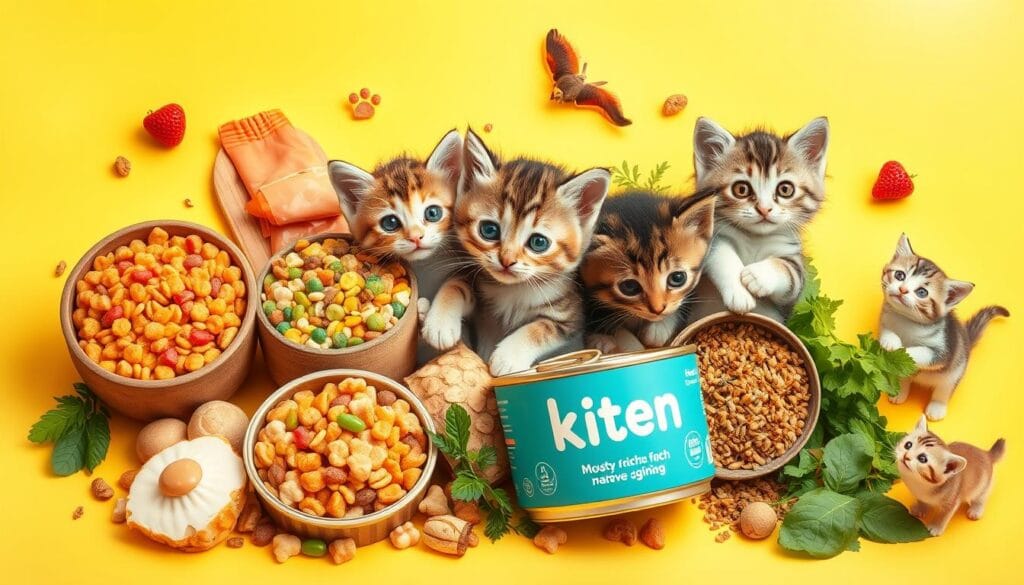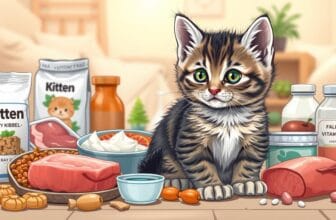
Table of Contents
Have you ever thought about feeding your adult cat kitten food? It might seem easy, but kitten and adult cat foods are very different. They have different nutrients that are important for your cat’s health. The big question is: When should you switch your cat from kitten to adult food, and how will it affect their health? What’s the Difference Between Kitten Food vs Adult Cat Food?
Introduction
Getting a new kitten is thrilling, but knowing the difference between kitten food and adult cat food is key. Kittens and adult cats have different nutritional needs. The wrong pet food can harm your cat’s health and growth. This article will help you understand the differences and when to switch your cat’s diet.
Kittens start eating solid food around 4 weeks old, says International Cat Care. By 8 to 10 weeks, they mostly eat kitten food. Canned kitten food has about 70% water, while dry kitten food has only 10%.
Kittens need more calories and nutrients than adult cats. They need a diet full of protein, amino acids, minerals, and vitamins. Look for kitten foods that meet the AAFCO’s nutritional standards. Kittens usually stop growing by 10-12 months, but bigger breeds may take up to 18 months.
Switching from kitten food to adult cat food should take 7 to 10 days. Start by mixing the new food with the old one in these ratios:
- Days 1 and 2: 25% new food, 75% old food
- Days 3 and 4: 50% new food, 50% old food
- Days 5 and 6: 75% new food, 25% old food
- Days 7 to 10: 100% new food
Premium adult cat food should have high-quality ingredients. It should meet or exceed AAFCO standards. Feeding your cat premium dry cat food can make their coat shiny, eyes bright, and muscles strong. It also keeps their skin and bones healthy and their stools small and firm.
Nutritional Needs : Kitten Food vs Adult Cat Food
Kittens
Kittens need more nutrients than adult cats to grow fast and strong. They require protein (35-50% on a dry matter basis) and fat (18-35% on a dry matter basis) for energy and growth. They also need more calcium and phosphorus for strong bones and teeth.
In their first year, kittens can grow up to 50 times their birth weight. This shows how important good food is for them. Kitten food has 35%-50% protein to help them grow well.
Kittens also need more magnesium, copper, iodine, and vitamin A than adult cats. The right mix of calcium and phosphorus in their food is key for their bones.
Adult Cats
As cats get older, their food needs change. Adult cat food should have at least 26% high-quality protein to keep their muscles strong. The fat content in adult cat food should be around 18%-35% on a dry matter basis.
Important amino acids like taurine and arginine are crucial in both kitten and adult cat foods. Adult cat food also needs a variety of vitamins and minerals, as the AAFCO guidelines state.

| Nutrient | Kitten Food | Adult Cat Food |
|---|---|---|
| Protein | 35-50% on dry matter basis | At least 26% on dry matter basis |
| Fat | 18-35% on dry matter basis | 18-35% on dry matter basis |
| Calcium | 2.5 grams per 1,000 calories | N/A |
| Phosphorus | 2.10 grams per 1,000 calories | N/A |
| Vitamins and Minerals | Increased levels of magnesium, copper, iodine, and vitamin A | Vitamins A, D, E, B12, K, thiamine, riboflavin, pantothenic acid, niacin, pyridoxine, biotin, and folic acid |
Key Differences : Kitten Food vs Adult Cat Food
There are big differences between kitten and adult cat food. These differences are key to making sure your cat gets the right nutrients at the right time.
Texture
Kitten food is softer and more moist than adult cat food. This is because kittens have smaller mouths and teeth that are still growing. The kibble in kitten food is also smaller, making it easier for them to chew and swallow.
This helps kittens grow fast and strong during their first year of life.
Ingredients
Kitten and adult cat food have different ingredients. Kittens need more protein, at least 30%, to grow muscles fast. They also need more fat for energy. Adult cats can do well with about 26% protein.
Kittens need special nutrients like taurine, omega-3 fatty acids, and minerals like calcium and phosphorus. These are important for their muscles, bones, brain, and eyes to grow right. Adult cat food may not have as much of these important nutrients.
Knowing the differences in kitten food texture, adult cat food texture, kitten food ingredients, and adult cat food ingredients is important. It helps you choose the best food for your cat.

Kitten Food vs Adult Cat Food: Transitioning Your Cat to Adult Food
As your cat grows, it’s key to know when to switch to adult food. Kittens usually grow up by 10-12 months. But bigger cats might take up to 18 months to reach full size. Switching foods slowly is important to prevent stomach problems.
When to Transition
Kittens usually hit 90 percent of their adult weight by 10 to 12 months. This is the best time to start switching to adult food. Bigger cats, like Maine Coons, might need more time, up to 2 years.
How to Transition
- Start the transition gradually over a 7-10 day period.
- Days 1-2: 75% kitten food, 25% adult food
- Days 3-4: 50% kitten food, 50% adult food
- Days 5-6: 25% kitten food, 75% adult food
- Days 7-10: 100% adult food
Watch your cat closely during this time. Some cats might need a few weeks to adjust. Choosing a high-quality adult food is vital for your cat’s health.
Switching to adult food is a big step for your cat. By doing it slowly and choosing the right food, your cat will stay healthy and happy.
Potential Risks of Incorrect Feeding
Proper nutrition is key for your cat’s health and happiness. But, mistakes can happen when picking the right food. Feeding kittens adult food or adult cats kitten food can be harmful.
Feeding Kittens Adult Food
Kittens need special nutrients for their growth. Kitten food has more protein, fat, and calories. But, giving kittens adult food can cause nutritional deficiencies and health problems. This might slow their growth, waste their muscles, and cause other issues.
Feeding Adult Cats Kitten Food
Adult cats need different nutrients than kittens. Kitten food has too many calories, protein, and fat for them. This can cause obesity, liver and kidney problems, and other health issues. It’s vital to switch your cat to adult food at the right time for their health.
To keep your cat healthy, choose the right food for their age. Be careful of the risks of feeding kittens adult food or adult cats kitten food. Talk to your vet to find the best food for your cat’s needs.
| Feeding Kittens Adult Food | Feeding Adult Cats Kitten Food |
|---|---|
|
|
“Proper nutrition is the foundation for a healthy, happy cat. Avoid these feeding mistakes to ensure your feline friend thrives at every stage of life.”
Choosing the Right Food
Choosing the right food for your cat is key for their health. Whether it’s a kitten or an adult cat, knowing their nutritional needs is vital. This knowledge helps ensure they stay healthy and happy.
For Kittens
Kittens need special food labeled as “kitten” food. This food is packed with protein, fat, vitamins, and minerals. It helps kittens grow strong and healthy.
Kittens also need more calcium than adult cats for strong bones. Their food has more energy, thanks to fat, to support their fast growth. In their first year, kittens can grow up to 50 times their birth weight.
For Adult Cats
When your kitten grows up, switch to adult cat food. Adult cats need a diet rich in protein and moderate fat. They also need less carbs. This meets their nutritional needs.
Look at the nutrition label on adult cat food. Make sure it meets the AAFCO standards for complete and balanced nutrition. Cats’ nutritional needs change as they age, so choose food made for adult cats.
“Providing the right food at each stage of your cat’s life is essential for their overall health and well-being.”
Conclusion
It’s very important to give your cat the right food at each stage of their life. Kittens need a special kitten food vs adult cat food to grow fast and strong. Adult cats, on the other hand, need a balanced cat food nutrition to stay healthy.
Knowing the differences and how to transition cat food is key. This way, your cat gets the right food for every stage of their life.
Kittens need lots of protein, fat, and vitamins to grow quickly. When they become adult cats, their food needs change. They need a balanced diet for maintenance.
Switching your cat to adult food at the right time is very important. It helps avoid health problems.
Choosing the right cat food and knowing what your cat needs is crucial. This helps your cat live a long, happy life. Always talk to your vet for advice on your cat’s diet. Look into brands like Blue Buffalo Wilderness and Nature’s Variety Instinct for the best nutrition.
FAQ: Kitten Food vs Adult Cat Food
What is the difference between kitten food and adult cat food?
Kitten food is higher in protein, fat, and calories to support growth and development. It also contains nutrients like DHA for brain development. Adult cat food focuses on balanced nutrition for maintaining weight and overall health.
When should I switch from kitten food to adult cat food?
Kittens should transition to adult cat food at around 12 months of age when they are fully grown. For larger breeds like Maine Coons, the transition may occur closer to 18 months.
Can kittens eat adult cat food?
Kittens can eat adult cat food in small amounts, but it does not provide the necessary nutrients for their rapid growth and development. It’s best to feed them food specifically formulated for kittens.
Is it safe for adult cats to eat kitten food?
Occasionally, it’s fine for adult cats to eat kitten food, but the higher calorie and fat content can lead to weight gain if eaten regularly.
What nutrients are essential in kitten food?
Kitten food should include high levels of protein, fat, and calories, along with nutrients like DHA for brain and vision development, and calcium and phosphorus for strong bones.
How can I tell if my cat is ready for adult cat food?
Signs include reaching physical maturity (usually around 1 year old), reduced energy needs, and a veterinarian’s recommendation based on your cat’s health and weight.
Can senior cats eat adult cat food?
Senior cats can eat adult cat food, but they may benefit from senior-specific formulas that cater to aging needs, such as joint support and easier-to-digest ingredients.
Source Links
- A to Z of Pet Food: Kitten Nutrition – Pet Food Institute – https://www.petfoodinstitute.org/a-to-z-of-pet-food-kitten-nutrition/
- Nutrition – General Feeding Guidelines for Cats | VCA Animal Hospitals – https://vcahospitals.com/know-your-pet/nutrition-feeding-guidelines-for-cats
- When should you switch from kitten food to adult cat food? – Orijen – https://blog.orijenpetfoods.com/when-should-you-switch-from-kitten-food-to-adult-cat-food/
- March Newsletter: How and When to Introduce Solid Food to Your Kitten – https://heartofdixievet.net/articles/965456-march-newsletter-how-and-when-to-introduce-solid-food-to-your-kitten
- Steinway Court Veterinarian – https://www.steinwaycourtvet.com/site/blog/2024/01/15/when-switch-kitten-cat-food
- Kitten Vs Adult Cat Food: The Differences | Blog – Love Nala – https://www.lovenala.com/blogs/nalas-blog/what-s-the-difference-between-kitten-adult-and-senior-food?srsltid=AfmBOoqR–gLDra_OvzRkf72NhbDAdDmI7iW-b1p9y7R_kBJWgeFCK7l
- Kitten Food vs Cat Food: What’s the Difference? Vet-Reviewed Facts – Catster – https://www.catster.com/nutrition/kitten-food-vs-cat-food/
- When to Switch a Kitten to Cat Food – https://www.progressive.com/lifelanes/switch-kitten-to-cat-food/
- Kitten Vs Adult Cat Food: The Differences | Blog – Love Nala – https://www.lovenala.com/blogs/nalas-blog/what-s-the-difference-between-kitten-adult-and-senior-food?srsltid=AfmBOoo20f_yvGDMPSK0QbKTBRjd9cYcds_PUP3gDTuuDJ5BFgkoqOt8
- Can Kittens Eat Adult Cat Food? – https://www.tuftandpaw.com/blogs/cat-guides/can-kittens-eat-adult-cat-food?srsltid=AfmBOory51UuJHf0rTFHr3cNCTcenicVwhTeXfpmb-LH9XyhLBJ-W4Qw
- Switching from Kitten Food to Cat Food: The Why, When, and How – https://be.chewy.com/switch-kitten-food/
- How & When to Switch from Kitten Food to Adult Cat Food | ACANA – https://blog.acana.com/switching-from-kitten-food-to-adult-cat-food/
- How often should you feed your cat? – https://www.vet.cornell.edu/departments/cornell-feline-health-center/health-information/feline-health-topics/how-often-should-you-feed-your-cat
- Can kittens eat adult cat food? Get the crucial info – https://untamed.com/blogs/nutrition/can-kittens-eat-adult-cat-food
- Kitten Vs Adult Cat Food: The Differences | Blog – Love Nala – https://www.lovenala.com/blogs/nalas-blog/what-s-the-difference-between-kitten-adult-and-senior-food?srsltid=AfmBOopC9Ol3d5XCBMkbIyJOHO7g2d4DxUbC3OirM0DPkH7gl7mBZ49j
- Feeding Your Cat – https://www.vet.cornell.edu/departments-centers-and-institutes/cornell-feline-health-center/health-information/feline-health-topics/feeding-your-cat
- Kitten Vs Adult Cat Food: The Differences | Blog – Love Nala – https://www.lovenala.com/blogs/nalas-blog/what-s-the-difference-between-kitten-adult-and-senior-food
- Choosing the Right Food for Your Kitten and Cat: A Lifelong Commitment to Health – Hilltop Animal Hospital – https://hilltopahep.com/choosing-the-right-food-for-your-kitten-and-cat-a-lifelong-commitment-to-health/
- Kitten Food vs Cat Food: The Key Differences, Pros & Cons | PangoVet – https://pangovet.com/pet-nutrition/cats/kitten-food-vs-cat-food/








[…] eggs can be a nutritious occasional treat for your cat, they shouldn’t replace their regular cat food. Always talk to your vet to figure out the best frequency and portions for feeding eggs to […]
[…] food: Choose high-quality kitten foods with animal proteins as primary […]
[…] Feeding adult cat food to kittens […]